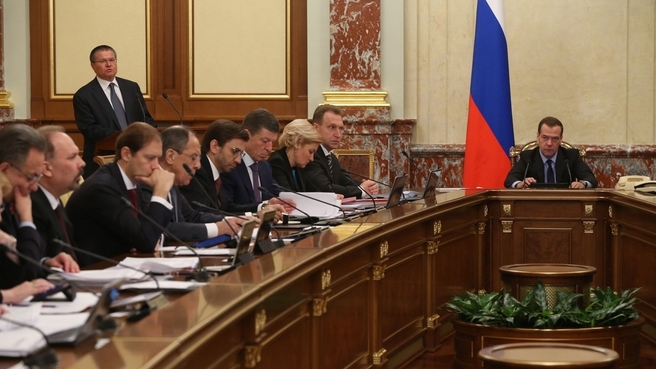Excerpts from Dmitry Medvedev's opening remarks at the Government meeting.
From Dmitry Medvedev’s introductory remarks:
Socioeconomic development scenarios and parametres have been prepared in basic, conservative and targeted versions. They differ in their assessment of the main macroeconomic indicators, which in Russia include the price of oil, GDP growth, inflation, the rouble exchange rate, investment levels, trade, and the development of industry and agriculture.
The initial economic conditions remain challenging, given sanctions, our limited access to foreign capital and technologies and other politically motivated actions against Russia, as well as the extreme volatility in the hydrocarbons market.
Under the current forecast following the basic scenario, the prices of oil will hover around $40 per barrel for Urals crude. There is also an action plan in case of a pessimistic scenario. The conservative forecast is based on oil prices of $25 per barrel.
Across-the-board cuts in expenses are not part of the plan. We don’t plan to increase the tax burden on the budget. But balancing the budget and making our budgetary policy more efficient will remain at the top of our agenda, and we will continue working to implement this. A number of decisions have already been taken to strengthen fiscal discipline.
Other decisions we’ve taken concern additional mobilisation of revenues, including from the management of state property.
We expect to have a budget deficit in the medium term. However, expenses will be fully covered by revenues and other sources of financing our fiscal deficit, such as foreign borrowing (as far as this is possible now), domestic borrowing and privatisation revenues.
Under the basic scenario, the gross domestic product will not grow or will even decrease this year but will increase by about 1-2 percent in 2017-2019. The targeted variant stipulates reaching an average global rate of growth.
To return the national economy to its growth trajectory, the Government will continue the policy of import substitution and priority development of vital industries, namely agriculture and high-tech industries. We will work to improve the investment climate, stimulate non-commodity exports and help small and medium-sized enterprises.
Our social decisions will be maximally balanced and measured, considering that we must above all support the people who have been hit the hardest in the current situation.












